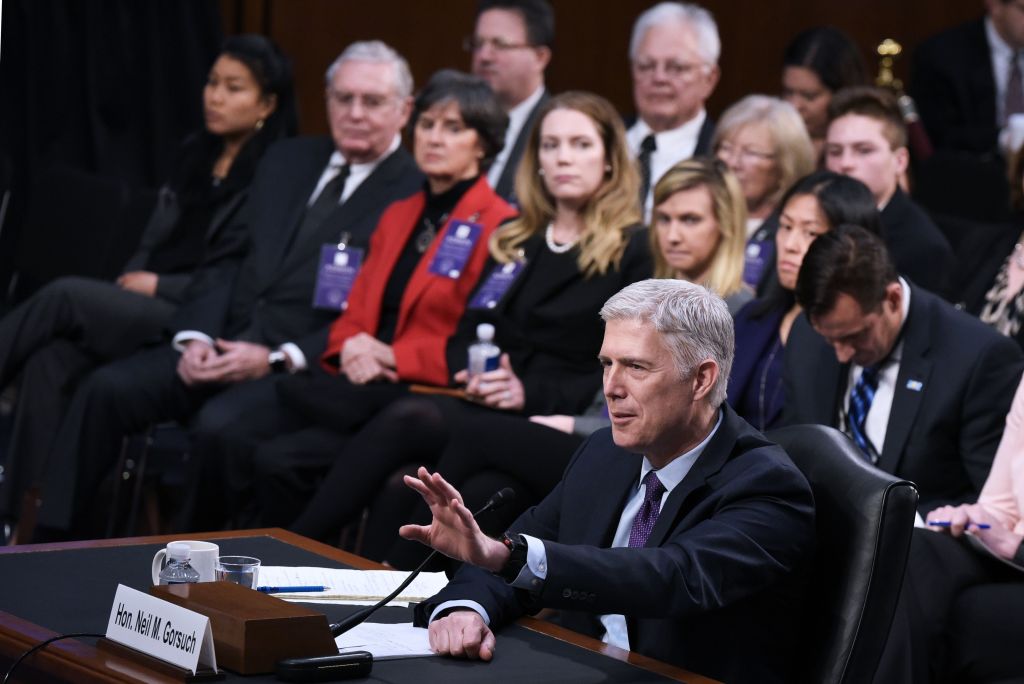Neil Gorsuch denies student's accusation that he implied women 'manipulate' maternity leave

A free daily email with the biggest news stories of the day – and the best features from TheWeek.com
You are now subscribed
Your newsletter sign-up was successful
Neil Gorsuch, President Trump's pick for the Supreme Court, took the opportunity Tuesday to clear up a former law student's claim that he'd implied women "intentionally manipulate companies" to receive maternity leave benefits, only to leave the company soon after the child is born. During the second day of his Senate confirmation hearing Tuesday, Gorsuch explained that the question the student referred to in her letter to Sen. Chuck Grassley (R-Iowa) and Sen. Dianne Feinstein (D-Calif.) was pulled from a "standard" legal textbook.
"One of the chapters in the book confronts lawyers with some harsh realities that they're about to face when they enter the practice of law," said Gorsuch, who has taught a class on ethics and professionalism for several years at the University of Colorado. He explained one of the problems presented in the chapter is a question "directed at young women" about maternity leave.
"Suppose an older partner woman at the firm that you're interviewing at asks you if you intend to become pregnant soon? What are your choices as a young person?" Gorsuch said. "You can say yes, tell the truth — a hypothetical is that it's true — and not get the job and not be able to pay your debts. You can lie — maybe get the job — and say no. That's a choice too. It's a hard choice. Or you can push back in some way, shape, or form."
The Week
Escape your echo chamber. Get the facts behind the news, plus analysis from multiple perspectives.

Sign up for The Week's Free Newsletters
From our morning news briefing to a weekly Good News Newsletter, get the best of The Week delivered directly to your inbox.
From our morning news briefing to a weekly Good News Newsletter, get the best of The Week delivered directly to your inbox.
Gorsuch said students then engaged in a Socratic discussion, weighing the pros and cons of each response to this "very difficult question." Hear Gorsuch's full explanation below. Becca Stanek
A free daily email with the biggest news stories of the day – and the best features from TheWeek.com
-
 Tourangelle-style pork with prunes recipe
Tourangelle-style pork with prunes recipeThe Week Recommends This traditional, rustic dish is a French classic
-
 The Epstein files: glimpses of a deeply disturbing world
The Epstein files: glimpses of a deeply disturbing worldIn the Spotlight Trove of released documents paint a picture of depravity and privilege in which men hold the cards, and women are powerless or peripheral
-
 Jeff Bezos: cutting the legs off The Washington Post
Jeff Bezos: cutting the legs off The Washington PostIn the Spotlight A stalwart of American journalism is a shadow of itself after swingeing cuts by its billionaire owner
-
 TikTok secures deal to remain in US
TikTok secures deal to remain in USSpeed Read ByteDance will form a US version of the popular video-sharing platform
-
 Unemployment rate ticks up amid fall job losses
Unemployment rate ticks up amid fall job lossesSpeed Read Data released by the Commerce Department indicates ‘one of the weakest American labor markets in years’
-
 US mints final penny after 232-year run
US mints final penny after 232-year runSpeed Read Production of the one-cent coin has ended
-
 Warner Bros. explores sale amid Paramount bids
Warner Bros. explores sale amid Paramount bidsSpeed Read The media giant, home to HBO and DC Studios, has received interest from multiple buying parties
-
 Gold tops $4K per ounce, signaling financial unease
Gold tops $4K per ounce, signaling financial uneaseSpeed Read Investors are worried about President Donald Trump’s trade war
-
 Electronic Arts to go private in record $55B deal
Electronic Arts to go private in record $55B dealspeed read The video game giant is behind ‘The Sims’ and ‘Madden NFL’
-
 New York court tosses Trump's $500M fraud fine
New York court tosses Trump's $500M fraud fineSpeed Read A divided appeals court threw out a hefty penalty against President Trump for fraudulently inflating his wealth
-
 Trump said to seek government stake in Intel
Trump said to seek government stake in IntelSpeed Read The president and Intel CEO Lip-Bu Tan reportedly discussed the proposal at a recent meeting